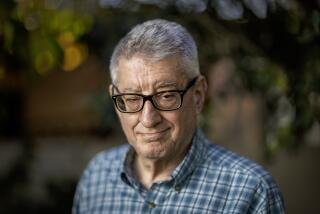Starr Speaks at Pepperdine, Notes ‘Sense of Belonging’
- Share via
Speaking breezily at the conservative Pepperdine campus where he feels “very much at home,” Whitewater independent counsel Kenneth W. Starr kept his long-standing agreement on Saturday to address the law school where he soon will be dean.
During his 35-minute speech on jury reform, Starr showed no lingering strain from the torrent of criticism that forced him to postpone becoming Pepperdine’s law dean until he has “substantially completed” his investigation of President Clinton and First Lady Hillary Rodham Clinton.
“I just have a great sense of belonging here,” Starr said while greeting a clean-shaven law student who wore a dark blue suit, white shirt and red tie.
Eager, well-groomed students lined up to pump the hand of their future leader. A few asked him to pose with them for a snapshot on the Malibu campus, where Young Republicans outnumber Young Democrats by more than 2 to 1.
“We are all very excited about him coming here, whether you favor his alleged political bent or not,” said Nicole Lucy, an editor of Pepperdine Law Review.
Initially, Starr committed to joining Pepperdine in August, but then said it was a mistake to set a specific date because it could erode public confidence in his commitment as chief prosecutor in the Whitewater investigation.
He was no closer Saturday to determining when he would finish the inquiry. “I’ve torn up all calendars,” he said.
Yet Starr said he looked forward to joining the law school. He will also be founding dean of Pepperdine’s new school of public policy.
Starr has twice taught seminars during the summer at the law school, becoming familiar, he said, with the “moral and spiritual dimensions” of its 30 faculty and 680 students. He has also been a member of the university’s board of visitors since 1992.
*
The university, he said, “has the most profound respect for the integrity and morality of the law. Those are values at a very fundamental level that I share.”
Pepperdine, while nonsectarian, has ties to the Churches of Christ, and considers a Christian commitment an important trait for its leaders. Starr, the son of a Baptist minister, attended Harding University in Searcy, Ark., which also has ties to the same church, a predominantly Southern denomination that believes in the literal interpretation of the Bible.
Ronald F. Phillips, the current dean who is stepping down to focus on university fund-raising, considers Starr “a principled person” who shares the university’s adherence to “conservative spiritual values.”
Furthermore, Phillips said, the high-profile special prosecutor and former federal judge will “help put the law school on the map, which we certainly need.”
In his lunchtime speech to the law school’s symposium on civil litigation reform, Starr argued that jury service has a rich tradition in America of involving the people in the legal system and educating citizens on their civic duties.
As more court officials consider replacing the traditional 12-member jury with a more easily managed size of six members, he urged that they consider the long-term ramifications of cutting back on these hands-on lessons in democracy to its citizens.
“We should think what is in the best interests in the long term of United States, given its stresses and strains.”
Pepperdine has agreed to hold the dean’s position open for Starr until he wraps up the Whitewater investigation.
Students, meanwhile, have been speculating on how close he will come to meeting his original commitment for arrival in late summer.
“My friends and I suspect he will show up around the same time,” said Roland Kelly, a third-year law student and an editor of the law review.
More to Read
Sign up for Essential California
The most important California stories and recommendations in your inbox every morning.
You may occasionally receive promotional content from the Los Angeles Times.










